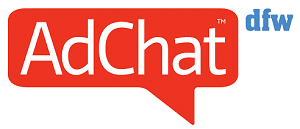Jimmy Asa & Phylissia Clark | BBB Serving North Central Texas
The Better Business Bureau (BBB) is a private, non-profit organization whose mission is to focus on enhancing marketplace trust. Businesses that affiliate with the BBB adhere to its standards through self-regulation. The BBB avoids any bias by refraining from endorsing any specific business, product or service.
Over 400,000 local dues- paying businesses in North America are accredited and vetted by the BBB and are allowed to use the BBB trademarked logo in marketing materials.
AdChat DFW recently interviewed Phylissia Clark, VP of Public Relations and Communications, and Jimmy Asa, Director of Ad Review, of the North Texas BBB, to explore in more depth how it helps companies understand the rules of the road when it comes down to truth in advertising.
AdChat DFW: What is your job for the Better Business Bureau?
Phylissia: Currently I’m VP of Public Relations and Communications for BBB Serving North Central Texas, which basically means the Dallas area and Wichita Falls. I head up Marketing, Communications, and Media Relations. For about seven years prior to doing this, I worked as an Ad Reviewer doing investigations of false, misleading, and deceptive advertising for BBB|NCTX. And even though there are 100 offices throughout the US and Canada of BBB, each one of them has to have somebody that does advertising investigations.
AdChat DFW: How do you teach companies to create advertisements that follow the BBB recommendations?
Phylissia: In the 1970s, the Better Business Bureaus and AAF jointly created a rulebook, the “rules of the road” for advertising professionals, entitled the BBB Code of Advertising. We update it regularly and it’s very similar to Federal Trade Commission advertising guides. The way we help companies is to teach them these business guidelines. When they’re stumped, we can go a step further and do what we call a prior to publication review. These are not legal reviews per se, but because the BBB Code of Advertising is similar to the FTC guides, it will likely help prevent legal challenges.
AdChat DFW: What are some of the common mistakes that companies do make?
Phylissia: We see everything, but a hot topic now are non-disclosure of material terms, especially DOT.com disclosures that are missing, and also info surrounding warranties and guarantees. Many advertisers don’t understand how to use those. Another evergreen topic concerns free offers. The use of the word free has not slowed down. There are times when advertisers are prohibited from using the term “free”. Those are some of the biggest ones, but it runs the gamut. It can be just about anything that you advertise.
AdChat DFW: Do you have to be a member of BBB|NCTX to be reviewed or to enlist your services?
Phylissia: Absolutely not. We hold every working company that transacts business to the same advertising guidelines and we offer prior to publication reviews for free to any company regardless of whether or not they’re BBB Accredited. If you’re accredited, we’ve already looked at your marketing materials and given you the thumbs up. If you’re not, you’re always welcome to bring it to us.
AdChat DFW: What type of companies do you typically help?
Phylissia: We help everyone, but the ones that generate the most case work for us are companies that have product efficacy claims, which is when a company claims their product can do something or do something better than somebody else’s product or that it has had some type of success rate. That can get really granular because it can be consumer takeaway related, such as our towels are fluffier or the scent on our towels lasts seven days longer than my competitor. Those types of things really keep us busy.
AdChat DFW: What are some of the common mishaps that companies make?
Phylissia: Often companies don’t think through the consumer takeaway. Even though everything could be absolutely true, they don’t think about the ways in which consumers can misconstrue what’s being said in front of them. We ask advertisers to not just make sure that everything they’re saying is true, but watch the commercial, watch the ads, look at the copy in the abstract and try and extract what consumers might take away that’s not explicit in the ad. The consumer takeaway is so subjective, and you can get in trouble with legal authorities for implied claims and for things that you didn’t absolutely say, but just were accidental takeaways of an ad.
AdChat DFW: When something does happen, do you help a with dispute resolution or offer arbitration services?
Phylissia: It’s more on a customer basis. If a customer sees your ad and doesn’t believe the promise has been delivered on it, they can come to the BBB and we create a mediation between the customer and the business to see if we can make both parties happy. Or, if consumers have a refund or customer service issue they can come to us for help. We do about 800,000 of those a year in the United States and Canada, and most of them have good resolutions. Often companies come to the table and realize that what they’ve said might not be what they delivered and they fix it.
A few times it doesn’t work out, and BBB then works with government agencies when companies deliberately don’t work with us to resolve those issues. We can provide them to law enforcement.
AdChat DFW: Do you work with the USPTO?
Phylissia: Not directly, but we can challenge trademark or copyright issues as a code of advertising violation, basically informing them that they are misleading customers by leading them to believe they are another company.
AdChat DFW: What general advice would you give to advertisers and do you think every ad should be scrutinized?
Phylissia: The first thing that I would say is go online to bbb.org or just search BBB Code of Advertising and familiarize yourself with it, because they’re excellent rules of the road. You’ll see whether or not your type of ad falls under any of those categories. The other thing we recommend is go into the Federal Trade Commission’s website and check out the FTC’s guidelines. The hot ones right now and are the DOT.com disclosures, & testimonials and endorsements because there are tons of influencers in the universe right now, and Native Advertising. Lots of them get in trouble for not saying that they were paid to promote a produce online.
When in doubt about whether or not what your company is producing is above board, you can always call a BBB professional in any of our 100 offices. They will help you reach a place for your ad that is persuasive but also doesn’t run afoul of our guidelines.
AdChat DFW: And because you are a “.org” your services are free?
Phylissia: Absolutely. All of our services are free to the general public and we’re business supported. It’s important to note that we were founded by advertisers to do investigations of false advertising. It started back in 1912 when we were chasing down snake oil salesman, and to this day advertisers still have a big influence on us. It’s not big brother coming to tell you what to do, it’s other advertisers trying to help you.
AdChat DFW: How do you gather your information on the ads?
Phylissia: We have a big Ad Review Department in the Dallas office, headed up by Jimmy Asa, and he has two additional staffers that work with him in the department. We get our ads through a variety of sources. Sometimes it’s competitor challenges, or the general public brings them to our attention. And we do proactively look at ads by going into the marketplace. Companies wanting us to check their ads also bring them to our attention.
We also have a great new portal called AdTruth where businesses and consumers can submit concerning ads directly to BBB ad reviewers. It’s available at www.bbb.org/ad-truth.
AdChat DFW: Does an ad review affect a company’s BBB Rating?
Phylissia: If a company we believe is saying something that they cannot prove and we’ve engaged in a lengthy dialogue with them, it can have a negative impact on their rating. And in some cases even resulting in an “F” rating if we believe that the claim is significant enough. Our ratings take into consideration a lot of things. Our ratings are very heavily complaint driven. Our rating takes into consideration government actions and our findings of false advertising or misleading ads. A company can’t get and A when they’ve only been around for a week because most companies live and die, as you know, in the first to five years. Last year, we closed close to 400 ad reviews and only 13 ended up with “F” ratings because they refused to substantiate or discontinue what we brought to their attention. And that’s just locally. Internationally, we’ve done 800,327 ad reviews collectively. We are supporting the advertising community in a massive way.
AdChat DFW: Is there a fun story you’d care to share about resolving an ad issue?
Phylissia: Oh yes! There was a company that was advertising, “get your high school diploma for $99” in six weeks. We found the printed ad during our regular ad monitoring practice, and it sounded too good to be true. We did a 21 Jump Street undercover shopping and Jimmy pretended to be a high school student needing to get a diploma. We mystery shopped the company just to see whether what this company was advertising was true. And, it was hilarious. We discovered they were just selling a piece of paper and weren’t offering legitimate classes. We ultimately referred it to the Attorney General and they sued for deceptive marketing and manipulation of official documents.
I had another case that I always tell people about because even the smallest thing can have a big impact. It concerned an older gentleman, well into his eighties, who purchased a ceiling fan from a big retailer. It had a beautiful picture of the ceiling fan fully assembled on the box. Despite his age, he managed to get on the ladder and install that motor in the ceiling and it worked. But, when he went back to the box there were no blades in the box. He was pretty angry when he called us. He had already called the company and they said, oh no, the blades are only available for an additional cost. Over six months, I engaged in a discussion with the company. They hemmed and hawed and fought with me over it, but eventually, after seeing what the FTC said, we convinced them that changing the packaging would save them liability in the future, they decided to reprint the product packaging to say that the blades were not included very explicitly. We made one older gentleman super happy by making a modification to product packaging and they eventually sent him the blades.
On another case we worked with a company that claimed that they could help raise your IQ 15 points in six-months. It was a big company with lots of sales and they really fought us. But you just can’t make those claims without clearly sufficient proof. They were also sued by the FTC after our referral.










